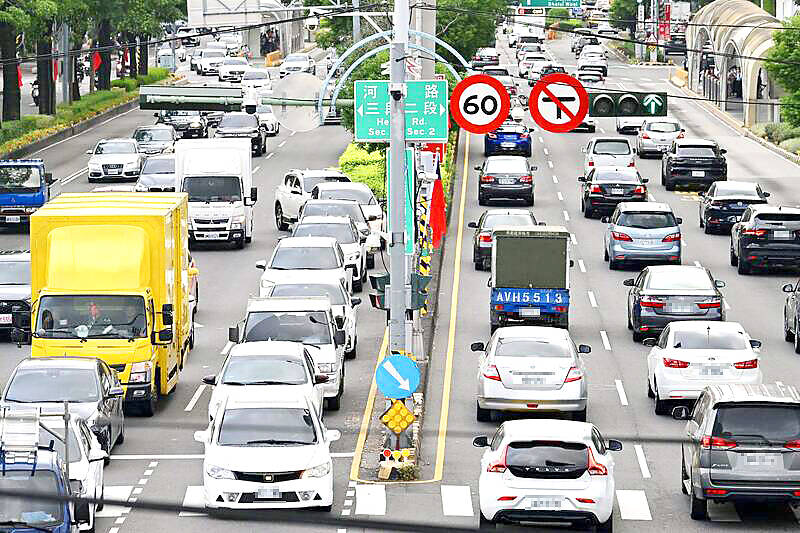New regulations on window films for new cars are expected to take effect next year after the Ministry of Transportation and Communications next month issues a safety directive about its use, Deputy Minister of Transportation and Communications Chen Yen-po (陳彥伯) said yesterday at a meeting of the legislature’s Transportation Committee.
He was responding to questions by Chinese Nationalist Party (KMT) Legislator Hung Meng-kai (洪孟凱) about the safety of window films, with Hung saying that Taiwan has neither instruments to measure visible light transmittance (VLT), or how much visible light passes through a window or glass, nor a mandate or standards that auto manufacturers are required to follow.
Japan mandates a VLT rate of at least 70 percent, while the US allows a range of 20 to 80 percent, and Germany bans using window films on front windshields, Hung said.

Photo: Liao Yao-tung, Taipei Times
Taiwan should set a VLT standard, which should apply to both new vehicles and those currently in use, he said.
Car owners who fail to comply with the regulations should be penalized, or they would simply flout the rules, he said.
Chen said that a safety directive on the use of window films in vehicles would be announced next month, which would apply to new vehicles sold on the market next year.
Those who do not follow the directive would be punished, he added.
Highway Bureau Director-General Chen Wen-juei (陳文瑞) said on the sidelines of the meeting that the directive was designed to encourage safe use of window films.
“When the directive becomes part of the Road Traffic Security Rules (道路交通安全規則) next year, we would stipulate when the new policy would take effect and vehicles that would be subject to the new rules,” Chen Wen-juei said, adding that Minister of Transportation and Communications Chen Shih-kai (陳世凱) has instructed that the policy should be implemented next year.
Owners of vehicles that fail to pass window film tests would be punished in accordance with the Road Traffic Management and Penalty Act (道路交通管理處罰條例), the bureau said.
The license plates of vehicles that fail inspections would be suspended if the owners fail to address the issue within a month and apply for a second inspection, or if they fail the inspection for a second time, it said.
Owners whose vehicles fail to undergo regular inspections or temporary inspections within a prescribed period would be fined NT$900 to NT$1,800, it said.
Owners whose vehicles failed inspections and have not applied for a second inspection for more than six months would have their license plates revoked, the bureau said.
The ministry has consulted practices in other countries and proposed different policies for commercial and non-commercial vehicles.
For non-commercial vehicles, the VLT rate for the front windshield should exceed 70 percent, it said.
The ministry is still debating whether not to impose VLT standards or at least a 30 percent rate for rear windshields and side windows in the back, and whether side windows in front should be more than 70 percent or at least 35 percent.
For taxis, the VLT rate should exceed 70 percent for the front windshield and side windows in front, while rear windshields and side windows in the back should exceed 35 percent.
Details would be finalized before the directive is announced next month.

The manufacture of the remaining 28 M1A2T Abrams tanks Taiwan purchased from the US has recently been completed, and they are expected to be delivered within the next one to two months, a source said yesterday. The Ministry of National Defense is arranging cargo ships to transport the tanks to Taiwan as soon as possible, said the source, who is familiar with the matter. The estimated arrival time ranges from late this month to early next month, the source said. The 28 Abrams tanks make up the third and final batch of a total of 108 tanks, valued at about NT$40.5 billion

Two Taiwanese prosecutors were questioned by Chinese security personnel at their hotel during a trip to China’s Henan Province this month, the Mainland Affairs Council (MAC) said yesterday. The officers had personal information on the prosecutors, including “when they were assigned to their posts, their work locations and job titles,” MAC Deputy Minister and spokesman Liang Wen-chieh (梁文傑) said. On top of asking about their agencies and positions, the officers also questioned the prosecutors about the Cross-Strait Joint Crime-Fighting and Judicial Mutual Assistance Agreement, a pact that serves as the framework for Taiwan-China cooperation on combating crime and providing judicial assistance, Liang

A group from the Taiwanese Designers in Australia association yesterday represented Taiwan at the Midsumma Pride March in Melbourne. The march, held in the St. Kilda suburb, is the city’s largest LGBTQIA+ parade and the flagship event of the annual Midsumma Festival. It attracted more than 45,000 spectators who supported the 400 groups and 10,000 marchers that participated this year, the association said. Taiwanese Designers said they organized a team to march for Taiwan this year, joining politicians, government agencies, professionals and community organizations in showing support for LGBTQIA+ people and diverse communities. As the first country in Asia to legalize same-sex

MOTIVES QUESTIONED The PLA considers Xi’s policies toward Taiwan to be driven by personal considerations rather than military assessment, the Epoch Times reports Chinese President Xi Jinping’s (習近平) latest purge of the Chinese People’s Liberation Army (PLA) leadership might have been prompted by the military’s opposition to plans of invading Taiwan, the Epoch Times said. The Chinese military opposes waging war against Taiwan by a large consensus, putting it at odds with Xi’s vision, the Falun Gong-affiliated daily said in a report on Thursday, citing anonymous sources with insight into the PLA’s inner workings. The opposition is not the opinion of a few generals, but a widely shared view among the PLA cadre, the Epoch Times cited them as saying. “Chinese forces know full well that